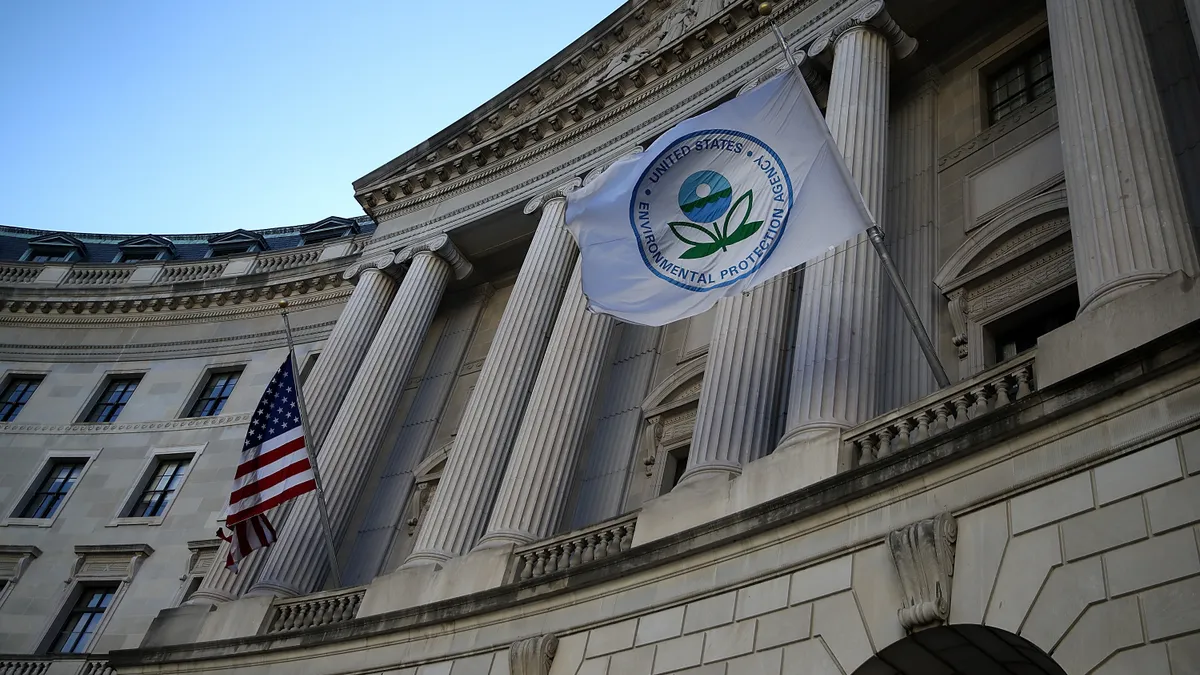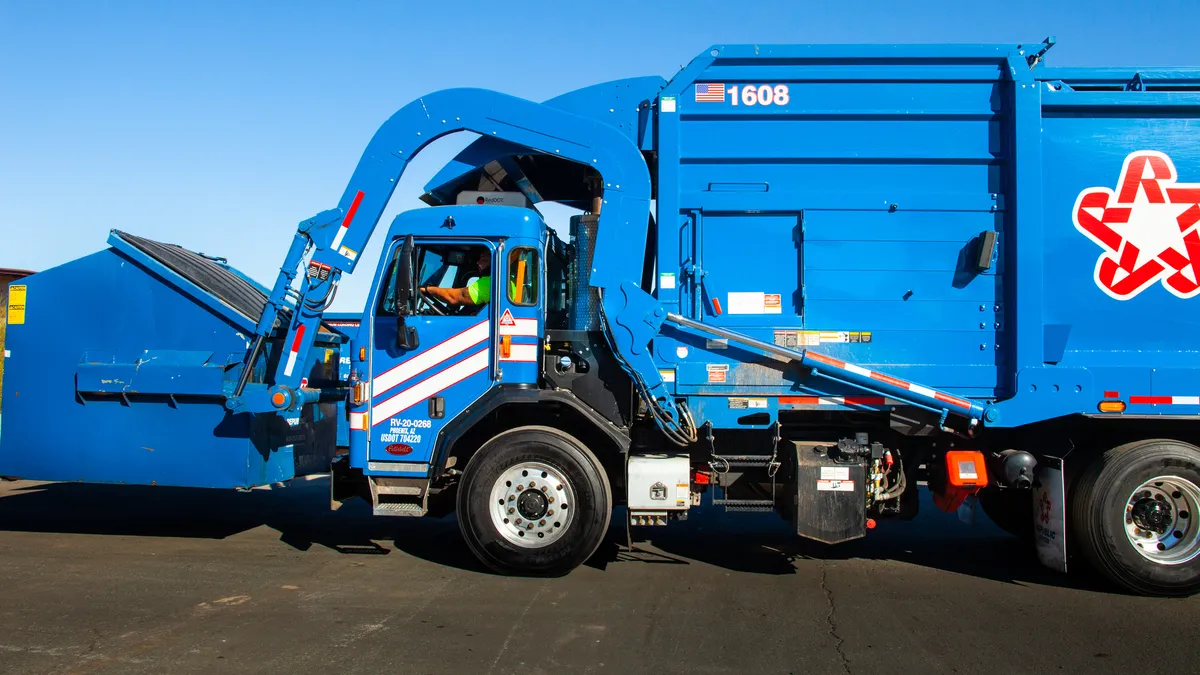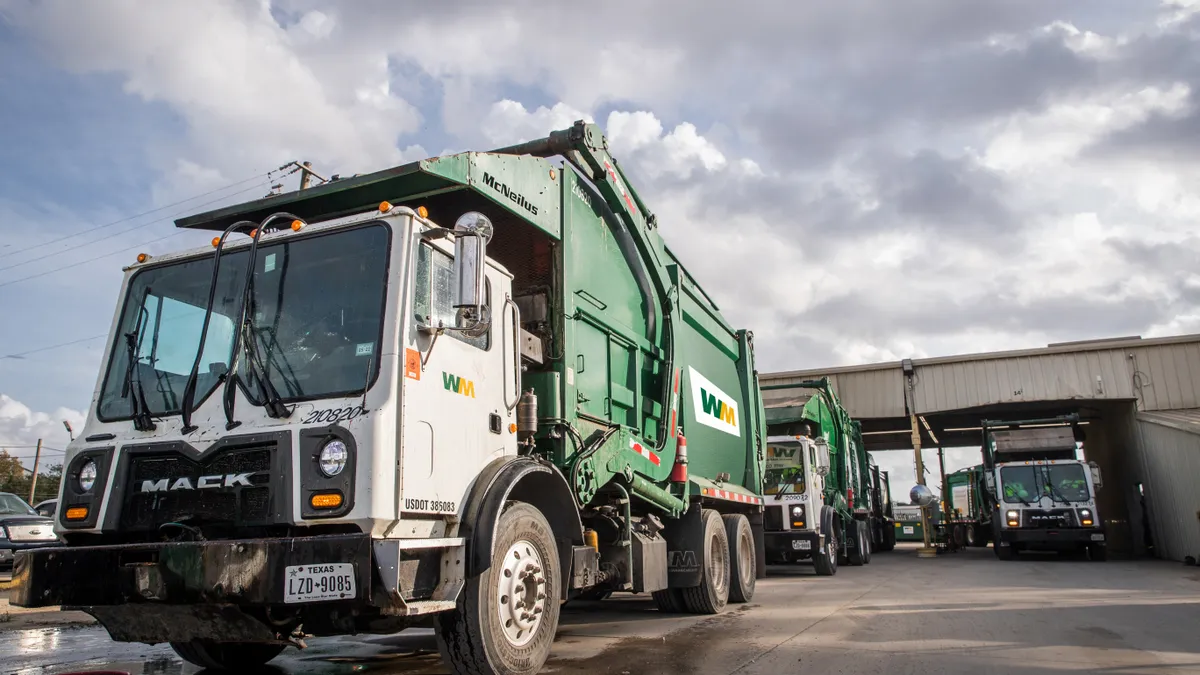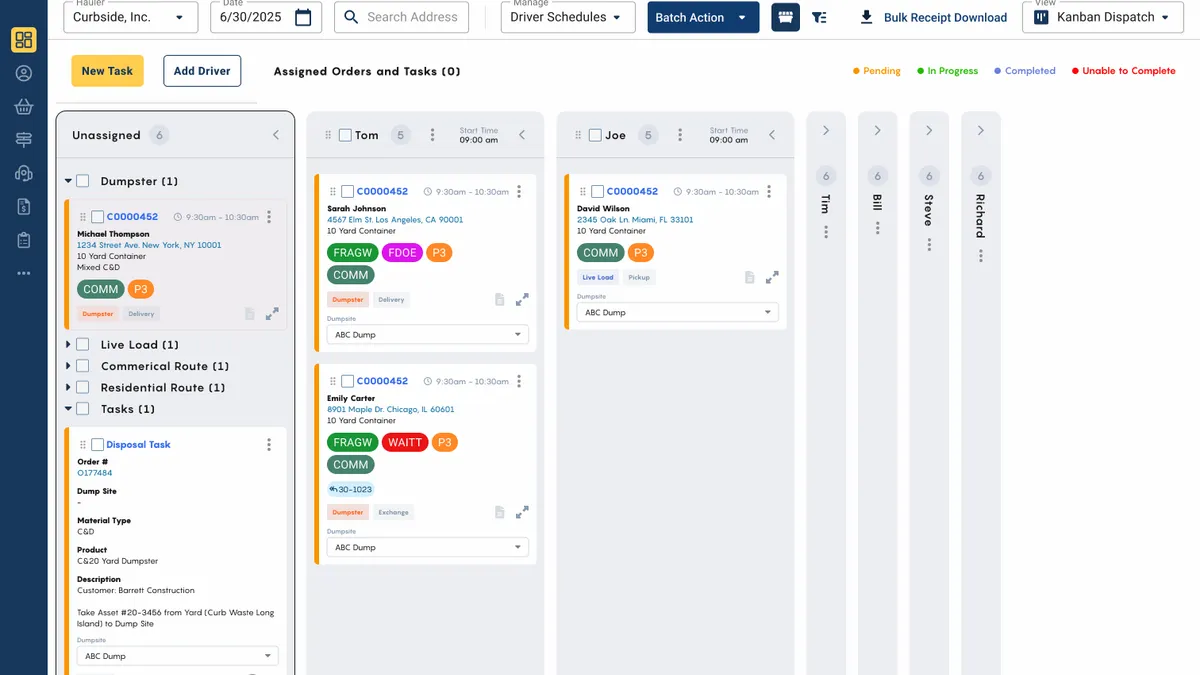When Waste Management CEO Jim Fish talks, people listen. Darrell Smith, CEO of the National Waste & Recycling Association, even went so far as to call him the "king of the whole industry." Between a panel at the annual WasteExpo investor summit, a subsequent "fireside chat" with Smith and last week's Q1 earnings call, Fish's comments have had a wide audience in the past week.
Waste Dive caught up with him in Las Vegas to pose some questions that hadn't been asked — and dig deeper into the ones that had.
The following conversation has been edited for brevity and annotated for context.
WASTE DIVE: Were you surprised about the Brad Anderson news? How did you react to that?
Brad Anderson resigned as Waste Management's chairman of the board on April 10, following news that a group he'd made a political contribution to created anti-Muslim ads during the 2016 election.
JIM FISH: You know, yeah, a little bit. Brad reached out, he explained the situation, but ultimately said "I think it's best for me to resign from the board. It takes the decision-making out of your hands and out of the board's hands." So he was very gracious about his time here and very professional. In my mind it was kind of his personal choice. I was disappointed because he really was a valuable board member for us, but he did call and take the decision away from us.
What comes next? How's your search process going?
FISH: There's not a set timetable. We've got a board meeting coming up here in a couple of weeks. We'll have certainly a conversation about it. Sooner rather than later we'll need to put somebody into that chairman's role. And then we will also start a search for a replacement board position.
So that could be somebody from outside or inside?
FISH: Yeah it'd be an outsider. I'd be very, very surprised if it's an inside candidate. And by the way, we never replaced Bob Reum who was our chairman who passed away in February of last year. So we technically have two board positions open.
Do you see this as an opportunity to get more diversity in terms of gender or age? Republic Services struck me as having some interesting new board additions recently.
FISH: Absolutely. To me, that's always [an important] consideration. We'll look at, not only diversity, we'll look at areas of expertise.
Waste Management recently reported first quarter earnings for 2018 that showed positive signs across every aspect of the business, except for recycling. The call was dominated by the topic just as much, if not more, than any other since China's scrap import ban was announced last summer.
Last week's earnings call focused heavily on recycling. To me it seemed like an effort to turn the page on the subject. Is that fair to say?
FISH: I mean, the irony of it was that 90% of the business is doing really, really well, and 10% is going through a bit of an ebb. But it's recycling, which is a big social issue, so I understood the level of conversation.
The rest of our business is, a fairly kind of consistent, not a lot of volatility to it model. Whereas, recycling does have some volatility and some ebbs and flows. And the investors in our business are not necessarily used to that. So it's not surprising that we get a lot of questions on it.
With that in mind, it's always going to be a little volatile, regardless of how things shake out. Do you ever see a chance that recycling could make up a larger share of your revenue?
FISH: Oh, no question. Yeah it absolutely could. I think before it becomes a larger share, though, we have to iron out the business model itself. Take out some of the volatility. More importantly, you could argue that China creates a lot of this volatility. But I don't fault China for this because [the industry] has been, over the past five years, ramping up the amount of trash that we export to them.
In my mind "recycling" is what we should be focused on, because that's what's best for the environment. The objective of recycling is to take this plastic bottle and either create another plastic bottle out of it or create carpet or some other alternative use, maybe energy, but it saves natural resources.
We've moved now to a new word, which is "diversion." And diversion is not necessarily about saving natural resources. It's about how much more of what had been going in the trash bin at the curb can now go in the recycle bin. And just because I moved from 50% diversion to 75% diversion does not necessarily mean that I've added 25 percentage points of recycled materials that save natural resources. It may mean that I just put it all in my recycle bin, and once we process it, we determine it's got to go to the landfill anyway.
Waste Management has been no stranger to working with large municipalities that set such "diversion" or "zero waste" goals and the company's website touts its ability to help customers work toward them. During his chat with NWRA's Smith, Fish said his company could theoretically get a customer to "zero waste" in a few months, but for five times the cost.
Some of your customers' recent contracts — Los Angeles, Seattle come to mind — they still have these very lofty diversion goals.
FISH: They do.
At what point do you say we can't sign on with that or we can't be part of that?
FISH: Look, I don't have a problem with a lofty diversion goal. It's just that if you're going to go from 50 to 75, it can't be 80% trash in that delta there. I mean if you want to go from 50 to 75, and it's all truly recyclable material, it's just an incremental increase in recycled material coming into a single stream, that's great for us, and it's great for them, and it's great for the environment.
But if your diversion goal simply results in people putting more trash in the recycle bin, then that's not good for the environment and it's not good for us. And ultimately it's not good for them because it's going to come back eventually as potentially a fee. There's got to be more than just a carrot involved, there's a stick involved. If you're not a good actor in terms of recycling, you need to pay a fee for that.
Fish made similar comments during the investor summit panel, saying that education can only go so far without some type of penalty or enforcement mechanism. Bowling balls, lawnmowers, a cruise ship chain and other surprises have become popular examples. Confusion over household packaging has also come up.
While all of this points to the potential for shifts in pricing structures within a variety of contracts, that in turn raises the question of how recycling costs compare to disposal costs. Waste Dive explored this topic in an interview with Waste Management's head of recycling, Brent Bell, during SWANApaloooza in March. At the time, he said recycling is the company's second best return on investment.
This week, Fish described the company's landfill network as one of its most valuable assets (second only to its employees) and had a similar response when asked.
In terms of economics, recycling is always going to be competing with what you describe as a very efficient landfill model. How can that ever shift when the underpinning economics for recycling are always compared to landfills?
FISH: Well, the interesting part about landfills versus recycling is that when the models are working well, recycling actually has our second highest return on invested capital, of all of our lines of business.
So maybe the most important metric to an investor is return on invested capital. The second highest return for our investors' capital, by line of business, is recycling. First highest being commercial collection. So, if you were to ask an investor in a functioning environment which line of business do you prefer — set aside the environmental aspect, just look at the financial returns — the answer has to be recycling. So, when people say "well, Waste Management's biased because they'd rather have this go into a landfill," that is not the case. Just look at the financials and that would tell the story. We've got to make sure though that that model is a functioning model, and right now it needs some help.
Throughout the week, and in the past, Fish has said figuring out the future of disposal is a top priority for his career at the company. While overall U.S. capacity is expected to last for many, many decades to come, that isn't the case for every region.
In also looking at other technologies to save space, could that potentially change the economic model [for recycling] while thinking about the future?
FISH: When I talk about the future of disposal, it's more than just landfills. It's also recycle facilities. We really haven't changed the single stream recycling model for a while.
I mean it's fairly limited in what we can bring in. And because there is such a huge amount of social attention being given to recycling there's this kind of natural inclination to want things to aspirationally go into my recycle bin.
So part of that answer to fixing that can be education, part of it can be going to a fee-based from a commodity-based model. But part of it can be technology, part of it can be changing the way the recycle facility operates. So instead of going back and telling municipalities here's a whole list of things that can't come into our single-stream, maybe we change the technology and we're able to go back and say, "Okay, half of that list that we told you that can't come in? Now good news, it can come in, because we've changed the technology."
Waste Management has been talking about using greenhouse gas emissions as a metric for decisions around recycling (such as glass) for multiple years, but stepped up that dialogue at its annual sustainability forum in February. At the time, Fish announced a grand "moonshot" pledge to reduce emissions by a factor of four. Further details haven't been released since then.
What is the latest on the moonshot initiative? Any more specifics you can provide?
FISH: We're still in the process of unpacking that. One place where we're not unpacking it is on natural gas vehicles.
We've doubled our vehicle purchases in the last five years. 90% of those are natural gas. So as we think about the moonshot and reducing GHGs, a big piece of that is going to be transitioning our fleet from diesel to natural gas. We've even looked at alternatives beyond natural gas. We looked at electric vehicles, but for now the best and most available solution for us, that helps us reduce GHGs, is CNG.
Fish expects more than 50% of the company's routed vehicles to run on natural gas by the end of 2018, with that number growing to 60% in the next two to three years. Though refueling capabilities for rural areas remains a challenge and will limit the potential for a 100% CNG fleet.
So more to come, but fleet is an area to watch for the moonshot?
FISH: Fleet is probably the area of focus for the moonshot at this point.
Could this be taken as a sign that there's a business case to be made for emissions reduction? Voluntarily, not needing state policy action?
Waste Management's latest annual filing indicates it could work with a potential carbon tax — and the company has cited California as an example — but also shows a preference for less regulatory activity on that front.
FISH: Absolutely. I've always felt that business should not wait for government to dictate what we do. My view is that government sets a baseline, but business should be well beyond that. Whether it's our safety regulations, whether it's environmental. Even something as simple as pay. You've got a minimum wage out there the government sets. That doesn't necessarily mean that we need to stick to minimum wage.
So I'm not waiting for government to tell us what to do with respect to GHG reduction or any type of environmental regulation. We pride ourselves on going well beyond what the government tells us we have to do.
The minimum wage reference led into a discussion about how the industry's largest public companies are sharing tax cut benefits with their employees. Waste Connections raised its base wage to $12, Republic plans to invest in locker room and vehicle upgrades and Waste Management will be paying out $2,000 bonuses at the end of the year.
Did you consider raising wages before the bonuses? How did that play out?
FISH: We've raised wages and we are constantly looking at where we are relative to the market. So our approach was really more of a retention tool. It was a retention tool for a group of employees that have a fairly high turnover to them, which is drivers and technicians. Our hourly employees. It was somewhat of a show of appreciation for the hard work that they do everyday. So there was a bit of altruism there. And then there was also wanting to inject money back into the economy because we're a beneficiary of that on the back end.
The reason we made it payable at the end of the year, was to give us 11 months of data to see is this influencing our retention or not. While we haven't made any decisions about what we're going to do on a go-forward basis, I would expect that over the next seven months we will continue to analyze that data. But with respect to base wages, we're constantly looking at where do we need to be, and we address that on a market by market basis.
Last fall, the company announced the promotion of Nikolaj Sjoqvist to become the first ever "chief digital officer." The buzz around routing software, autonomous features, IoT connectivity and other areas has risen in recent years — in some cases to the benefit of newer competitors — with Waste Management now admittedly playing catch-up on certain fronts.
How has that new role been going and what we can watch for on a technology side in the next say year or so?
FISH: Nikolaj, with a background at HP Compaq and McKinsey after that, brings a different perspective to technology. I would tell you this is a business that has not been as proactive technologically as maybe other industries.
I'm sitting here looking at a rear loader right behind you, and that is a truck that has been around for, I don't know, 50 years, 60 years. But now there are other residential trucks, the automated side loader, the Curotto Can, that have replaced — with a different technology solution — the rear loader. But you still have a lot of rear loaders, and they're still being sold as a new vehicle here. So we've not been as innovative as some other industries.
I think Nikolaj brings a bit of expertise, but also a sense of urgency there. Look, if we're really going to start to think of ourselves as being a customer-centric company, then we've got to think about providing a better customer interface. We've got to provide better use for data and analytics. We've got to understand the backbone of our company in terms of systems. So he's doing literally thousands of surveys of customers. Because it's one thing to role something out, but if the customer isn't interested in it then what good is it.
Anything else you'd like people to know about what's coming next?
FISH: I think you're going to see us over a period of months and years really focus a lot more on the customer and a lot more on people issues. It will be interesting see what we do with the $2,000 in 2019 and beyond.

















